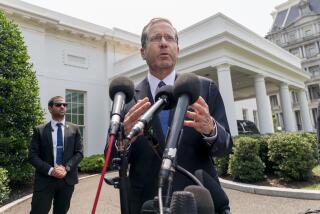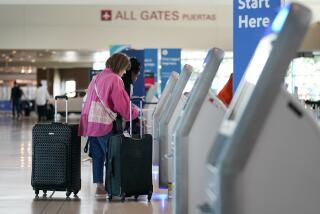U.S. Wants Airline Rules Eased Globally : Transportation: Revised regulations would allow carriers to establish an international hub-and-spoke system.
- Share via
WASHINGTON — In the first major attempt to change international aviation policy since the late 1970s, the Clinton Administration announced plans Tuesday to begin talks with nine European nations in an effort to remove obstacles to development of a truly global air transport system.
In addition, Transportation Secretary Federico Pena announced an agreement between the United States, Canada and Australia that will ban smoking on flights operated by their airlines among the three countries.
The aim of the talks, as outlined by Pena, is to allow commercial airlines to establish international “hub-and-spoke” systems much like those adopted by many U.S. carriers after the industry was deregulated. It would allow U.S. carriers to use these destinations as stopping points to other cities worldwide, a practice currently discouraged in some countries.
Lifting current barriers would allow U.S. airlines to offer more competitive prices, fly to more cities and increase the frequency of flights, according to a report released on the policy aims. The Administration did not release the names of the nine countries but included are nations within and outside of the European Union, said Patrick Murphy, acting assistant secretary for aviation and international affairs.
“Taken together, the accords we seek with this group of European partners will provide important benefits for travelers, cities, airlines and their employees, both in the U.S. and in Europe,” Pena said Tuesday in Chicago.
Acknowledging that some countries might be hesitant to swiftly relax restrictions on U.S. air traffic, the policy statement allows for transitional agreements that would ultimately result in completely open airline markets. It would also consider agreements that would eliminate restrictions in several exclusive areas, such as air cargo or charter services.
“A lot of progress can be made incrementally,” said Stephen Kaplan, general counsel for the Department of Transportation.
Countries that refuse to participate in the effort, however, may face a less flexible United States. The report suggests limiting access to the U.S. market for those countries’ airlines and restricting the airlines’ commercial relations with the United States.
The Administration also intends to encourage other countries to turn over state-owned airlines to private owners. The policy statement also warns countries that protect their airlines from competitive pressures that they will be left behind in the expanding global economy, depriving consumers of greater cost efficiency.
The report cites intentions to make air trade agreements with other countries as well, including those in Asia, South America and Central Europe.
In addition, it says, the Administration wishes to further free up air trade with Canada and the United Kingdom.
The smoking ban, which is part of Pena’s goal of making all American public travel smoke-free, will affect nonstop flights and will become effective in early March. Pena said that the agreement is part of a U.S.-supported effort by the International Civil Aviation Organization to ban smoking on international flights by July 1, 1996.
The ban applies to flights operated for paying passengers, not flights chartered by a person, company or organization.
More to Read
Inside the business of entertainment
The Wide Shot brings you news, analysis and insights on everything from streaming wars to production — and what it all means for the future.
You may occasionally receive promotional content from the Los Angeles Times.










